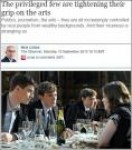These days, hacks are nobs

Greg Dyke, a former BBC director-general, famously described it as "hideously white, male and middle class", in effect portraying the national broadcaster as a combination of covert racism, sexism and class bias.
Could such an organisation be an authentic voice of a multicultural and supposedly meritocratic modern Britain? More importantly could it be trusted by ethnic minorities, women and working class Britons?
Now it seems this "hideousness" has spread across the British media, both print and broadcasting, especially in relation to class. Journalism is now a "rich kids’ game", according to a new study on social mobility.
Its most striking finding is that, rather than opening up to a wider social cross- section in accordance with the trend in other professions, journalism has become more of a closed shop in recent years with the old school tie network tightening its stranglehold.
Research shows that 54 per cent of Britain's 100 top journalists attended private schools while only 7 per cent of the nation's population was privately educated. And 45 per cent of them went to Oxbridge. They include editors, columnists and broadcasters. The number of privately educated journalists is higher in 2014 than it was in 1986 (47 per cent) when similar research was done.
According to Lindsey Macmillan of the Institute of Education, University of London, a co-author of the study, the number of journalists coming from privileged backgrounds has shot up, making it more elitist than ever before while barriers elsewhere in society show signs of falling.
It is interesting to note that when British society was, in fact, more overtly class conscious, journalists tended to come from families whose income was not much higher than the national average. That gap has widened hugely since then.
“Those who were born in 1958 and went on to become journalists came from families with income less than £100 more than average but for those born in 1970, this difference had increased to over £600,’’ she said. According to Macmillan, journalism has joined banking and accountancy, occupations which have become “highly socially graded” over the past decade or so.
While social mobility is a problem in Britain generally, in the media it seems to be particularly acute and appears to be going in reverse direction as these figures show. And this in a profession which fancies itself as an agent of social change.
As The Observer columnist Nick Cohen pointed out, the fact that journalists, "the supposed tribunes of the people now hail from wealthier backgrounds than bankers ...ought to cause embarrassment all round".
Commentators say that some of Britain's finest journalists of a previous generation from modest backgrounds would have had to struggle to make it if they had had to operate in today’s circumstances.
Recalling, his own experience, Cohen wrote, ”I look at my younger self today and wonder if I could become a journalist on a serious newspaper (today). My parents were teachers. They were comfortably off by the standards of 1980s Manchester, but they could have never afforded to rent me rooms in London and cover my expenses while I went from internship to internship.’’
I've been away from India for too long and so won't presume to know what's happening there but I wouldn't be surprised if things are not very different. The circle does seem to have shrunk considerably since I entered journalism in the early 1970s. In fact the process had already begun when I left India 15 years ago.
The arrival of television and the glamour and high salaries that went with it made it a happy hunting ground for the young from well-connected families: the children of senior civil servants, diplomats, army officers, politicians and even journalists. I must stress that I'm talking only about English language television channels.
Around the same time, a similar trend crept into print journalism on the back of lucrative fixed-term contract jobs that big national newspapers started to offer to escape the "tyranny" of the wage board.
So long as journalism was a poor man's profession, the access for ordinary mortals was comparatively easier as the children of the rich and the well-connected chose more lucrative careers. However, even then, you couldn't simply breeze in to big newspapers simply on the strength of your credentials. You needed someone to open the door for you. And I'm saying this on the basis of my own experience.
In a way, journalism both in Britain and India has always been somewhat incestuous in its social make-up. But over a period of time it has become more so even while preaching egalitarianism to the rest of the world.
This is not to cast any aspersions on those who have had a friendly entry. There are some very fine journalists among them. But there would be many equally fine boys and girls who may never be able to get a break because they don't come from the "right" background.
Ultimately, it is not about individuals. The broader issue is that in-breeding in any profession is bad because it limits the talent pool, but it is particularly bad for liberal professions such as journalism which are required to reflect a country’s social and cultural diversity in all its complex forms. And they can do that only if their own make-up reflects that diversity.
(Hasan Suroor is a London-based columnist)






